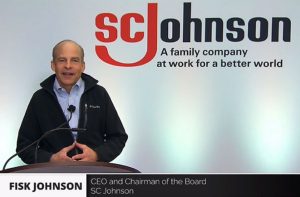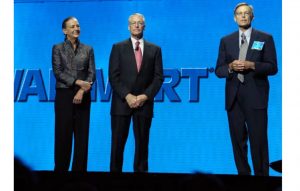Table of Contents
- 1 Examples Of Top Companies That Have Aligned Corporate Culture With Family
- 2 How To Identify the Best Family Ethics for Your Company
- 3 How To Craft a Corporate Culture Aligned with Family Ethics
- 3.1 1. Consult Widely
- 3.2 2. Communicate Clearly and Consistently
- 3.3 3. Lead By Example
- 3.4 4. Establish A Code of Conduct
- 3.5 5. Provide Ongoing Training
- 3.6 6. Integrate Values into Performance Metrics
- 3.7 7. Integrate Events That Reflect the Family’s History
- 3.8 8. Instill Values in Succession Planning
- 4 Benefits Of Aligning Corporate Culture with Family Ethics
- 5 Align Corporate Culture with Family Ethics
If Carly Fiorina had studied the intentions of the Hewlett and Packard families, she wouldn’t have made the blunder of misaligning the corporate culture with family ethics. The children of HP founders Bill Hewlett and Dave Packard gave Fiorina a hard time during her tenure after she “diluted the company’s focus” by merging with Compaq, a company whose culture they alleged was incompatible with HP’s.
The founders’ or family’s true intentions for the business should take center stage in every aspect of leadership and decision-making. For this reason, most family businesses opt to have family members at the helm of their leadership to maintain the purpose and values intended by their forefathers.
In other words, C-Suite executives can only thrive in family businesses if they understand family values and how to integrate them into the corporate culture successfully. Family ethics should guide you in crucial company processes such as onboarding, setting objectives, handling stakeholders, and reacting to issues that arise.
This guide highlights the strategies for establishing top family ethics and aligning the corporate culture for long-term sustainability and success.
Examples Of Top Companies That Have Aligned Corporate Culture With Family
Value-driven businesses embody a legacy that not only keep in line with the will of the founders but also serves their customer base uniquely. While countless family businesses have their corporate culture aligned with family ethics, we have highlighted a few sticking on their course.
3. SC Johnson Company

Sc Johnson’s logo with its current chairman’s image
When Samuel Curtis Johnson founded SC Johnson in 1886, his mission was to “make life better and bearable for future generations.” The company manufactures household cleaning supplies and other consumer chemicals.
The founder was a devout methodist and a philanthropist who believed in helping those in need and giving back to the community. Therefore, he ensured the new startup had a corporate culture driven by responsibility, teamwork, respect, and integrity.
Johnson passed on these family ethics to his descendants, who would take up the roles for future generations. So far, five generations of the Johnson family have led the company, with the current CEO, Fisk Johnson, being the great-great-grandson of the founder.
Some of the family ethics still evident in SC Johnson’s corporate culture include:
- Philanthropy

SC Johnson
SC Johnson is known for its extensive social responsibility and philanthropic history, which reflects the Johnson family heritage. Today, the company strives to improve people’s lives through environmental awareness, health, education, entertainment, and more.
The company’s culture has been to donate to courses that bolster the community. For example, SC Johnson was among the leading companies to provide notable donations to fight the Covid menace.
2. Ford Motor Company

Ford Motor Company
Henry Ford founded the Ford Motor Company in 1903 to provide affordable and reliable cars while providing a friendly working environment for workers. Ford also pioneered social responsibility, innovation, and mass production and supported philanthropic causes in public health and education.
The Ford family still holds a controlling stake in the company, with the current executive chairman, William Clay Ford Jr, being Henry’s great-grandson. The C-suite executives at Ford have continued Henry Ford’s legacy of social responsibility and ethical governance.
For example, the company has a conduct handbook for employees at all levels that outlines the principles and values that should guide their decisions and actions. The handbook has become a an endearing aspect in the company’s numerous awards as the most ethical workplace.
One of the most notable family ethics evident in Ford’s corporate culture today is innovation. Henry Ford, the founder, was an inventor who revolutionized the auto industry with his mass production of affordable cars. He established the Ford Foundation to promote social welfare while spearheading innovation in education and research.
His descendants have remained true to this course by maintaining and improving the Ford Foundation for better results in reducing poverty and injustice, strengthening democratic values, and advancing human achievement.
Moreover, Henry Ford’s innovative values are evident in Ford Motor Company’s investment in new technologies and exploring new markets and solutions.
1. McCain Foods Limited
McCain Foods Limited was founded in 1957 by four brothers: Robert, Andrew, Wallace, and Harrison McCain. This multinational frozen food company specializes in French fries and other potato products.
The four brothers grew up on their father’s farm, acquiring first-hand experience in agriculture and entrepreneurship. As a result, they developed a passion for agricultural sustainability and food engineering.
The McCain brothers instilled these family ethics in their descendants, who have continued to run the business for generations. The entrepreneurial spirit has been one of the most evident values of the frozen foods giant as it continuously invests in the research and development of new products in the market.
Its new McCain Accelerator program seeks funding, mentorship, and resource access to startups with promising solutions in the food industry.
- Innovation
McCain Foods Limited also focuses on its family value of innovation as it supports courses and practices geared towards innovations and meeting unique customer preferences. The launch of its first plant-based product, SureCrisp, in 2020 resulted from its innovative corporate culture that targeted vegans.

The launch of McCain Foods’ first plant-based product, SureCrisp, in 2020 resulted from its innovative corporate culture that targeted vegans.
Similarly, McCain Foods Limited donated $1 million to the University of New Brunswick in 2021 to set up a food engineering course to bolster research and innovation in health practices and food sustainability.
The list could go on and on for integrating family ethics into the corporate culture. However, you now have a glimpse of how family heritage matters in the corporate world. One of the most essential skills that have made these alignments a success is the ability of C-suite executives to understand the family itself.
How To Identify the Best Family Ethics for Your Company
The best family ethics for your company depends on the family and their compatibility with the corporate culture. So, with a clear picture of the founders’ true intentions and the dynamics across generations, aligning the corporate culture with the family ethics would be easier.
1. Study The Family and The Business Founders

Alice, Rob, and Jim Walton, children of Walmart founder Sam Walton
Whether or not you are part of the family, you need time to understand the family history and traditions behind your company. You want to know the family’s core values and ethical considerations in its approach to relationships and business.
One of the easiest and quickest ways to understand the business and its founders is through comprehensive family history research. With a comprehensive family background, knowing the individuals down the lineage and the values passed down generations would be easy.
Moreover, a comprehensive genealogy report conveys crucial family narratives and rituals highlighting fundamental family values and ethics.
Other ways that genealogy can help understand family ethics include:
- You understand the family’s identity, belonging, and the values they share.
- You learn the achievements of ancestors and previous generations and find the need to preserve and honor that legacy.
- Establishing the collective and individual strengths and weaknesses across the family.
- Learn how to effectively resolve conflicts and dilemmas likely to arise in family businesses.
- Crafting a solid plan for the legacy succession for future generations.
Besides understanding the family, you also want to know the founders’ exact vision and mission when they established the firm. For example, in the case of the aforementioned HP CEO, it’s clear that she didn’t consider HP’s innovative and collaborative culture when she negotiated the Compaq merger.
The families of HP founders Bill Hewlett and Dave Packard knew Compaq’s culture focused on cost-cutting and efficiency. They feared this misalignment could significantly dilute HP’s ethos.
They perceived commitment to excellence, integrity, and a pioneering spirit as foundational values to the company’s success. For this reason, Compaq’s emphasis on efficiency and cost control was seen as a cultural clash that would alter HP’s commitment to its historical principles.
2. Identify Traditions and Rituals
Like families, companies have traditions, rituals, and ceremonies that enhance their corporate culture and reflect the family heritage. Your comprehensive genealogy report’s references, anecdotes, and statements will highlight critical family practices that reflect family ethics.
The practices include:
-
Family Philanthropy

Companies make donations as part of their alignment of corporate culture with family ethics
Check if the family engages in activities like volunteering for causes, donating to charities, sponsoring scholarships, etc. If yes, know that the family heritage may be centered around giving back to the community, helping those in need, and making a positive difference in the world.
The aforementioned SC Johnson is an example of a company with family philanthropy aligned with its corporate culture.
A similar practice in the company could be in the form of a corporate social responsibility (CSR) program where the company supports initiatives such as inclusion, sustainability, health, education, and more. In addition to fostering a culture of values and ethics, this alignment could boost the company’s brand, reputation, and loyalty.
-
Family Rituals

Family Reunion
Family rituals, ceremonies, and events also hint at the ethics you can incorporate into the company. Events such as family gatherings, regular dinners, meetings, and anniversaries reflect the family’s history and value, fostering a sense of continuity.
Be sure to attend or take notes from regular family gatherings to observe the connection, loyalty, and heritage shared among family members. The reunions also serve as the best platform for the family to discuss values, goals, and the overall direction of the family and the company.
Similarly, you could organize regular meetings at the workplace where all employees interact and share their work and non-work-related experiences. Such get-togethers have enhanced workplace communication, collaboration, and culture. Most importantly, regular meet-ups in the company foster a sense of identity, belonging, and pride.
To get comprehensive family history research, we recommend contacting Record Click Professional Genealogists for customized research on the family background and its relation to the business.
Our experts will structure the family hierarchy and provide details about key family events and rituals observed down the generations. Most importantly, genealogy reports include key ethics that can enhance the corporate culture.
Grab our free consultation today to discuss more about your case and kickstart your discovery of family ethics to align to the corporate culture.
3. Consult Key Players

Seek Professional Support and Use due diligence
To avoid ending up like the aforementioned ex HP CEO, consult the company founders or the key family representatives in the company to avoid making contradictory decisions at the top level.
It’s also advisable to speak to employees and other partners who’ve worked closely with the family or the company to get their view of the family and its values.
Also, review past documents, letters, and workplace handbooks to understand the ethics observed in the company and the approaches used by your predecessors on major decisions such as business mergers and conflict resolution.
How To Craft a Corporate Culture Aligned with Family Ethics

Family members and relatives can offer insights into their ethics
As a C-suite executive, identifying the best family ethics is one thing, but aligning them with the corporate culture is another. You need to know what to take and what to drop, considering its compatibility with the corporate culture and the company’s overall objectives.
For a company guided by family ethics, CEOs and CFOs can make business decisions that look irrational to the outside world. They can forgo lucrative opportunities and instead invest in strategies that may not make economic sense on paper but are consistent with the company’s values and long-term goals.
However, with the pressures influencing business choices, it is more tempting for C-level executives to cut corners to remain competitive. It doesn’t have to be the case with corporate cultures aligned with family ethics.
Most of these corporate cultures have no pressure for crazy growth, so you’d instead build on the history of integrity, philanthropy, and meaningful rituals. For most of these companies, it’s not just business; it’s a legacy.
Harvard Business School professor Clayton Christensen blames the failure of executives in aligning and fostering family ethics in the corporate culture on the trap of marginal thinking. In his book How Will You Measure Your Life? Clayton argues that one pitfall top executives make is failure to consider the big picture or long-term consequences.
For these and other reasons, we have compiled critical steps that C-suite executives should take to align corporate culture with family ethics.
1. Consult Widely

consult widely
In the same way that C-suite executives should consult when trying to figure out the family ethics and the company’s history, they should do the same when planning to effect any change in the corporate culture. One crucial aspect of a change management strategy is planning and collaboration with all stakeholders.
An all-inclusive approach creates a sense of goodwill while bolstering trust among parties. Besides, synchronizing everyone prevents project delays or roadblocks likely arising from resistance or confusion.
2. Communicate Clearly and Consistently

Symbol of togetherness
Elaborate the family values and ethics to all stakeholders through convenient channels popular with everyone in the organization. The CEO should explain how the ethics align with the company’s objectives.
C-level executives should also ensure that the customers and community feel the alignment of corporate culture with family ethics. Therefore, they should offer quality products, services, and social initiatives while listening to their expectations and needs. For example, the CEO of Loblaw launched the PC Optimum Insiders program, focusing on customer feedback and recognition.
3. Lead By Example
C-level executives, including CFOs and CEOs, serve as role models, and their actions and behavior set the tone for the company. Therefore, it’s imperative to ensure that business decisions align with the established ethical principles and the family’s long-term vision.
4. Establish A Code of Conduct

Incorporating professional can help solve many puzzles
A guidebook with family values would play a significant role in keeping stakeholders aligned with the updated corporate culture. A code of conduct helps create a shared understanding of what is expected in every department.
Companies such as the Ford Motor Company that use conduct handbooks have achieved a milestone in advancing the standards of ethical business practices and earned global honors for the same.
5. Provide Ongoing Training
Encourage regular training to reinforce existing and new family values and ethics. Regular workshops help instill changes in the employees’ minds and help them understand the significance of these values in the company and daily activities.
6. Integrate Values into Performance Metrics

Ethical And Legal Considerations
Most CEOs and other C-level executives are hell-bent on professionalizing the business and topping the markets. However, for a corporate culture aligned with family ethics, performance should not only be determined by profits. Employees should feel appreciated not only for their output but also for their contribution to the company’s overall purpose and values.
7. Integrate Events That Reflect the Family’s History

LG CEO William Cho has actively engaged with company employees through end -of-year F.U.N. Talk’
Events in a company make family ethics and heritage more evident. The type of events the CEO should incorporate into the corporate culture depends on the family itself and the identified practices that could enhance the corporate culture.
For example, family history and values are explicit in events like anniversaries and milestone celebrations where all stakeholders gather for a common course or to mark a continuity. In the same way, incorporating philanthropy in the corporate culture reflects the family’s commitment to social responsibility, creating a broader sense of purpose.
It is, therefore, for this reason that all board meetings should have individuals from the family, especially those who have been with the company in the past to ensure that decisions align with family values.
8. Instill Values in Succession Planning
Studying the policies and practices of each family business will help you understand the succession patterns in the company. For example, companies like Walmart and Ford have family members and descendants on the board of directors.
Such observations and advice from key players can help you prepare the next generation of leaders and have them embrace the family’s ethics and maintain long-term objectives.
Benefits Of Aligning Corporate Culture with Family Ethics
When the corporate culture is aligned with family ethics, it becomes a values-driven culture expressed in the vision, mission, actions, and goals. Some of the benefits that a values-driven culture can have on the business’s long-term vision include:
- Incorporating the unique identity of the family gives the company a competitive advantage.
- Family values create stakeholders’ sense of belonging, meaning, and purpose, fostering loyalty, trust, and commitment.
- Since values guide problem-solving and decision-making, the culture facilitates innovation, adaptation, flexibility, and creativity depending on the environment and available opportunities.
How A Strong Corporate Culture Aids Smooth Leadership Transitions

Enhancing generational transition
The family’s and company’s goals, vision, and values reflect a solid corporate culture. Here are the different ways that leadership transition gets to benefit from a strong corporate culture:
- It helps family members and all employees understand and commit to the business’s long-term strategy.
- A value-driven corporate culture provides communication and education to C-suite executives, the general staff, and family members about their roles as business stewards. As a result, there will be qualified and motivated leaders who’ve internalized the culture and can carry on the legacy.
- A clear and robust corporate culture reduces potential disputes and conflicts among family members and stakeholders over the company’s ownership, governance, or direction.
- Aligning corporate culture with family ethics helps prevent probate fights and inheritance woes, as the policies are clear on succession, estate planning, and wealth transfer.
- Having family ethics in the corporate culture also fosters a sense of responsibility and pride among heirs and family members for preserving and enhancing the family legacy.
- A solid corporate culture aids smooth leadership transitions by encouraging family collaboration and harmony through regular events, forums, and meetings that celebrate the heritage and achievement of the business.
Align Corporate Culture with Family Ethics
Aligning the corporate culture with family ethics is a game-changer for C-suite executives as it ensures that the true intentions of the business founders remain intact. Besides, a values-driven culture makes it easy to steer the company as the metrics differ with profit-driven businesses.
However, the list of family ethics can be overwhelming, and not all will apply to the corporate culture. Therefore, CEOs should strive to study the company and family history associated with the business and identify areas in the corporate culture that need to be updated.
One of the most effective ways is to hire a professional genealogist and have them highlight the family background, the company founders, and family rituals that could be more important to the family than profits.
Having a professional handle that part will save you a boatload of precious time and avoid common mistakes in DIY family history research.
Contact us today or schedule a call.








